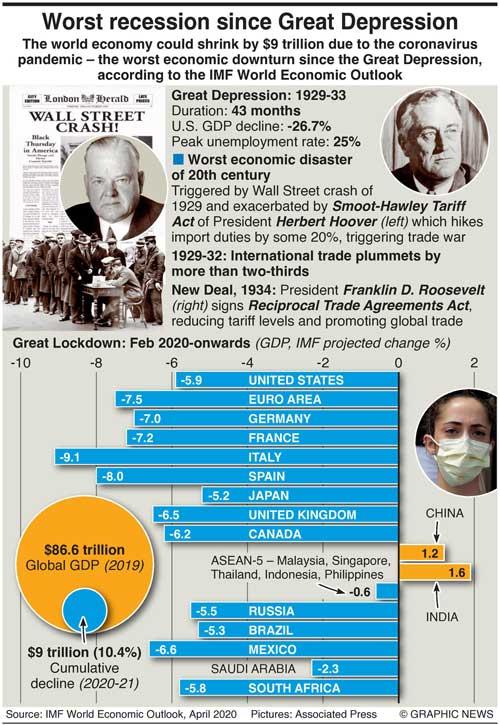01 May 2020 - {{hitsCtrl.values.hits}}
Even if the world is coming to an end tomorrow, the big powers, it appears, won’t give up their pursuit of power.  They are not morally inclined or humble enough to learn the unity lesson the coronavirus teaches them. Driven by power-politics agendas or their belief in political realism, their focus is overwhelmingly on acquiring power and enhancing it by all means good and bad, come Covid-19 or high water.
They are not morally inclined or humble enough to learn the unity lesson the coronavirus teaches them. Driven by power-politics agendas or their belief in political realism, their focus is overwhelmingly on acquiring power and enhancing it by all means good and bad, come Covid-19 or high water.
With a vaccine or cure that could end the Covid-19 pandemic still not on the horizon, the United States and China appear to be daggers drawn at each other, instead of coming together as a united front to confront the virus and expedite the search for a cure. The divide is widening faster than it was before the novel coronavirus seized them unawares.
Thus there is little surprise that, despite the Covid crisis, major military manoeuvres are still taking place. If not for the fact that news agencies are preoccupied with the pandemic, these military developments would have made headlines continuously for weeks; world leaders would have reacted differently and the United Nations Security Council would have met to assess the possible threat.
Noteworthy are the heightened military activities in the South China Sea and, to some extent, Iran’s successful launch of a military satellite. Under normal circumstances, these events could have had shattering impacts on world politics.
In recent weeks, the US and China have been accusing each other of using the Covid crisis as a distraction to reinforce their respective military strength in the South China Sea. The one-upmanship game has seen a surge in the deployment of warships and provocative military exercises in the disputed waters.
While the world’s attention has been on the pandemic since February, Vietnam accused China of sinking one of its fishing vessels; the Philippines has reported a hostile encounter with a Chinese naval vessel near the Spratly islands, over which the two countries are at a dispute; Australia and the US dared to challenge the Chinese naval presence in the South China Sea by conducting a naval exercise in a bid to contest China’s sovereignty claims over several island territories in the wake of China declaring two new administrative districts in the South China Sea.
The most incendiary was Tuesday’s incident when China rushed ships and aircraft to “track, monitor, verify, identify and expel” a US warship from the Paracel Island chain in the South China Sea. In a strongly-worded statement,  China’s People’s Liberation Army said the US action was “incompatible with the current atmosphere as the international community is fighting the pandemic … as well as the regional peace and stability.”
China’s People’s Liberation Army said the US action was “incompatible with the current atmosphere as the international community is fighting the pandemic … as well as the regional peace and stability.”
The spike in hostilities comes as the US-China diplomatic relations keep souring over accusations centred on the Covid crisis and the South China Sea disputes. This week, US President Donald Trump, in the centre of a fresh controversy over his wild suggestion that Covid-19 could be cured by injecting disinfectants, reiterated that investigations were underway to find out whether China had deliberately delayed sharing vital information regarding the coronavirus.
The US warned of tough legal action to follow if it was proved that China destroyed information regarding the early samples of the virus before it mutated into virulent forms, thus making it difficult or near impossible for other countries to come out with effective control measures. In other words, Washington was implying that China’s action, if deliberate, was criminal or tantamount to launching bio warfare, probably combined with economic warfare.
Secretary of State Mike Pompeo also insisted that China, in violation of the United Nations protocol, notified the World Health Organisation too late about the outbreak in Wuhan, the epicenter of the disease in China. In a prompt response, the Communist Party-run Global Times slammed Pompeo as sinister and a threat to world peace.
Buttressing the accusations were US media reports based on the US embassy’s diplomatic cables from Beijing. The reports claimed the US embassy two years ago had raised concern over inadequate safety measures at a Wuhan research laboratory where coronavirus tests were conducted. The reports have prompted US politicians to call for punitive measures against China and court action to seek damages in billions, if not trillions, of dollars. Going by the anti-China sentiments in the US and pro-US countries, a Nuremburg-style Covid-crimes tribunal cannot also be ruled out.
The Chinese foreign ministry has slammed these charges as “barefaced lies”.
The hostilities seem to be increasing with each passing day, indicating the reconciliation required to deal with the pandemic is not going to happen.
Part of the antagonism is fuelled by Trump’s Republican team to prop up his reelection bid in November this year. The Trump team is all out to exploit the widespread anti-China sentiments in the country. According to a survey conducted by pollster Harris, 75 percent of Americans believe China is responsible for the virus’s spread in the US, while a majority also believe China should be held accountable.
But the US cannot economically survive an all-out hostility with China. Can it impose tough sanctions on China as it depends heavily on Chinese supply chains? With more than 26 million job losses, the US cannot afford to take more protective measures to insulate itself from China or to pursue Trump’s trade war with Beijing, unless Washington takes a plunge to diversify its investments and supply chains to Asia and Africa. One possibility is shifting the US investments from China to India, an essential strategic ally.
A cold war accompanied by an intensified trade war amid growing hostilities and court cases for damages from Beijing for the spread of the pandemic is the last thing the post-Covid world would like to see when the expectation worldwide will be for a cooperation-based international system that can ensure the physical, psychological and economic health of the people of every nation.
26 Dec 2024 8 hours ago
26 Dec 2024 9 hours ago
26 Dec 2024 26 Dec 2024
26 Dec 2024 26 Dec 2024
26 Dec 2024 26 Dec 2024